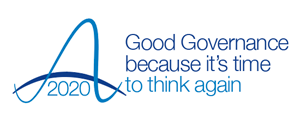Living in a VUCA world
08 July 2020

GGI’s 2019 Festival Review featured an article entitled Strategy for a VUCA world by Lawrence Tallon, who is now Deputy Chief Executive at Guy’s and St Thomas’s but at the time was Director of Strategy, University Hospitals Birmingham (UHB) NHS Foundation Trust.
VUCA is an abbreviation of volatility, uncertainty, complexity and ambiguity – all characteristics that have been in plentiful supply since the start of the COVID-19 pandemic.
At the heart of Tallon’s article was the idea that, to facilitate rather than hinder the radical innovation required to navigate the profound changes lying ahead for the health service, governance would need to be more adaptive than ever before. It’s a thesis that bears revisiting in the wake of everything that has happened since March this year.
Brexit, World Cup and crystal ball gazing
During the NHS 70th anniversary celebrations in June 2018, as the UK obsessed about Brexit and the World Cup, thoughts inevitably turned to what the health service would look like in another 70 years, to which the only sensible answer was, of course, that no one could possibly know.
Tallon wrote: “How many people 40 years ago would have predicted the internet, or 20 years ago, the rise of the smartphone – and how both have changed our lives so much in that time? The only thing we can say with confidence is that the practice and delivery of healthcare will be dramatically different in 70 years’ time – in some ways that we can imagine and others that we perhaps cannot.”
We can be confident about some changes. Our ability to keep people living fulfilling lives for longer will continue to improve – although overall life expectancy has not risen all over the country and has in fact fallen over the past decade for some groups. And although we might not be able to predict what technology will enable over this long period, we can be sure the changes it makes to our lives will be profound.
Similarly, we know that the way health systems are organised will change. As Tallon wrote: “They’re going to need to if we’re to keep pace with demographic, epidemiological and technological changes and make high-quality, universal healthcare sustainable and available for future generations.”
But, just as with technological advances, we can’t possibly know yet what those changes will be – a truth that’s been forcefully underlined by the dramatic events of the past few months.
Coping with disruption
One of the challenges facing those who run our healthcare organisations is to develop forms of governance that cope well not just with the status quo – something that mature governance systems tend to be good at – but also with disruption.
As Tallon wrote last year: “How can we best govern healthcare organisations as we know them now, continuing to provide high-quality care to the patients of today, while simultaneously reimagining and transforming the ways in which healthcare will be offered to citizens and patients in the future?”
One of the biggest challenges facing UHB, he added, was to “…work across the wider health and local government system to better manage demand and to provide care in the most appropriate settings and the most convenient ways to meet patients’ needs. Instead of patients always having to come to hospital to receive specialist medical care, we’ll use technology to project our expertise outside our hospital walls, to patients in their own homes or to professionals supporting patients and citizens in their community settings.
“Many of the technologies and practices we’ll need to harness are already well established in other sectors. Their uptake in healthcare has often been inhibited because of lead-footed regulation, vested interests in the status quo, or institutional and professional conservatism.
“In the period ahead, we’ll need to fundamentally redesign healthcare payment systems to promote prevention as well as activity, management structures to oversee health systems rather than organisational silos, and information systems to share appropriate data while protecting personal confidentiality. All of this requires far more nimble, adaptive and far sighted systems of governance than we have now in the health service.”
He concluded: “We do not pretend to know what the next 70 years will hold for the health service – in Birmingham or the country as a whole. What we know is that there’ll need to be a fundamental shift from preserving models of care as they are now, to embracing innovation and new ways of providing care.
“The challenge for systems of governance, and those who create and manage them, is to be forward-looking and to facilitate those profound changes, rather than seeking refuge in the familiarity of the past.”
Questions for boards
These reflections are worth bearing in mind as boards plot the tricky course through the recovery phase of COVID-19 and beyond. We would advise spending some time deliberating on the following questions:
- What do we think we know about the future and why do we think we know it?
- What do we think will be the main drivers for change in our system and how can we influence them?
- How can we work with others in our system, including the communities and people we serve, to respond to these drivers and produce plans for sustainability?
- What do we need others to do outside our system to help us continue to provide sustainable services, including regulators and government?
If this bulletin prompts any comments or questions, please contact us by calling on 07732 681120 or emailing advice@good-governance.org.uk
Martin Thomas
Copywriter
